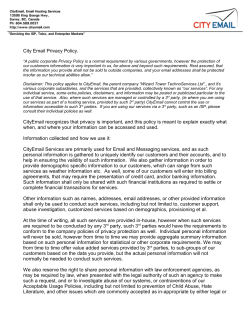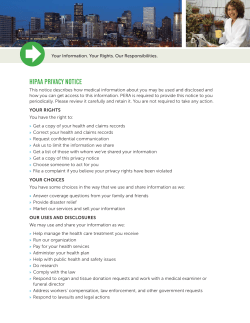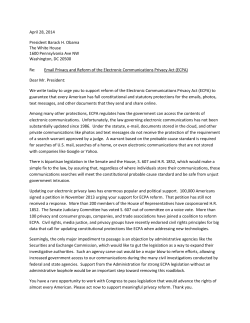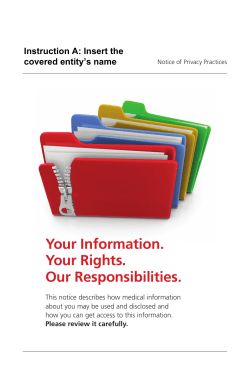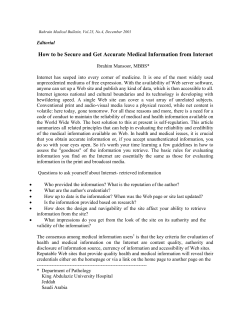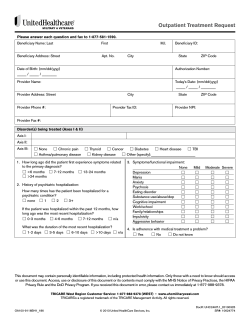
Why you MUST protect your customer data
Why you MUST protect your customer data Businesses of all sizes are responsible for compliance with customer data security and privacy laws—and those that don’t comply may face fines or legal action. Who should be concerned about security and privacy? Customer data is a key currency of today’s information-based economy. Regardless of your industry, you probably collect, store, and share information about your customers. This data may include postal addresses, e-mail addresses, telephone numbers, credit card/bank account details and NI numbers. If you use any of these types of information, you need to keep reading. TechAdvisory.org SME Reports sponsored by How data thieves strike Data thieves use a number of low-tech and high-tech methods to access your data. Here are some of the more common ones. TJ Microsystems is your partner in providing reliable, cost-effective IT support that takes Method Description the headache out of dealing with your com- Dumpster diving Thieves steal papers with personal information left improperly discarded in your trash. puters for good. By outsourcing the manage- Postal theft Thieves steal mail left in your unsecured mailbox. ment, maintenance and support of your busi- Employee theft Employees steal the personal information of your customers or other employees. General theft Thieves steal wallets, checks, credit cards, or computers. Hacking Thieves obtain unauthorized access to your computer network to steal customer information. Phishing Thieves try to trick your customers into revealing their personal information by sending e-mails that appear to be from your company and/or creating a fake web site that looks like yours. Pretexting Thieves make phone calls to your business in a customer’s name in an attempt to learn more about the customer. ness IT to TJ Microsystems, you can finally take the stress out of using the technology your business counts on everyday. With a customized IT solution from our team of experts, you’ll finally begin to think of your technology as a strategic investment, rather than a constant drain on your time and resources. 1 Why you MUST protect your customer data Once data thieves have the information they want, they use it to open fraudulent credit card accounts in your customers’ names and make purchases without their knowledge, open fraudulent bank accounts in your customers’ names and write checks on that account, or even get loans in your customers’ names. Security breaches could damage your business The Financial Services Authority (FSA) recently fined the insurance company Zurich £2.275m for failing to have adequate systems and controls in place to prevent the loss of customers’ confidential informationi. Even if you don’t face legal action, your good reputation could be significantly i http://www.insuranceage.co.uk/insuranceage/news/1729376/fsa-slaps-zurich-uk-record-fine-loss#ixzz1I57vMSIz compromised by data security breaches. Security breaches can erode consumer trust and ultimately hurt your bottom line. You can be a target, too Identity thieves want your business information. In fact, they may target small and medium businesses because their data security programs may not be as strong as those of larger companies. They’ll take your bank account and credit card numbers, Federal Employer Identification Number, and other federal and state governmental identification numbers. They’ll use this information to open credit card accounts in your business name and make purchases without your knowledge, open bank accounts in your business name and write checks on that account, or get a loan in the name of your business. In some cases, they can actually sell your business or property without your knowledge. Small businesses are MORE at risk than large businesses Popular wisdom may hold that large businesses are most at risk for identity theft and fraud - but that’s not the case. As we’ve already shown, data thieves are flexible: they operate using both high-tech and low-tech methods. As a result, security applies to every business that collects and stores customer information. Small businesses are a particularly attractive target because they often don’t have the strong data security protections that large businesses have. © TechAdvisory.org SME Reports sponsored by TJ Microsystems. 2 Why you MUST protect your customer data Compliance isn’t a choice Regardless of whether you think you’re at risk for data theft, you are legally required to take proactive steps to prevent it - no matter how small your company is. For example, all businesses must comply with the Data Protection Act of 1998 when handling information about clients, employees, or suppliers. ii http://www.ico.gov.uk/for_organisations/ sector_guides.aspx Other requirements vary by business type.ii Small financial businesses, for example, must also comply with FSA regulations. As a small business owner or manager, it’s your responsibility to stay current on privacy and security laws affecting your customers - so establish good security and privacy practices now. International policies could affect you More than 50 countries have personal data protection laws that regulate the handling of customer information - and even companies with no physical presence abroad have to comply if they engage in international business-to-consumer e-commerce. Firewalls are not enough You might think that the right combination of hardware and software will prevent data security and privacy exposure - but technology is just one piece of the security and privacy equation. Consider this scenario: you’ve equipped your computer with the latest network security software. But one day a customer calls your business to ask what credit card you have on file for their account. They give their name and address to an employee who then looks up the information on your system. Your employee reads the credit card number to the customer. However, the caller isn’t really a customer; they’re a criminal who found the name and address of one of your customers in your black bin bag full of rubbish. © TechAdvisory.org SME Reports sponsored by TJ Microsystems. 3 Why you MUST protect your customer data Indeed, in small and medium businesses, the greatest data security risk might not be technology, but the uneducated end user. Symantec’s SMB Information Protection Survey, which was published in June 2010, reported that 42% of small and medium companies have lost proprietary or confidential information - and of the companies that lost data, 23% blamed insiders inadvertently losing data, while an additional 14% blamed broken business processes. The point: it’s not just about good technology. Effective security and privacy policies and proper employee training are also essential. Creating a security and privacy policy A security and privacy policy tells your customers how you will treat their personal information. In essence, it explains how you will collect it, how you will use it and keep it secure. Once you have a written policy that accurately describes your intended treatment of customer data, you’ll need to communicate it to your customers. For example, you can distribute it on paper by posting it on a sign in your office, give customers a written copy when they complete a transaction with you, or mail it as part of a promotional piece. Additionally, you can distribute your policy online by posting it on your web site, and if your customers have agreed to receive e-mail notices from you, send it to them via e-mail. Communicating your privacy policy to your customers will increase the trust they have in your business - because when they know that you plan to use their information carefully, they will be more likely to share it with you. Resources to help you write a privacy policy Need help writing an online privacy policy? Have a look at this website: http://www.businesslink.gov.uk/bdotg/action/detail?itemId=1076142085&type=RESOURCES, © TechAdvisory.org SME Reports sponsored by TJ Microsystems. 4 Why you MUST protect your customer data Employee education is paramount Employees who handle customer information should play a significant role in protecting that information. In its 2009 data breach report, Verizon Business found that insider errors were a factor in two-thirds of all breaches that were investigated on behalf of clients. Think about all the different ways your business collects, stores and uses customer information. Now list the people who handle or have access to the information. Anyone who appears on your list should play a significant role in protecting sensitive information. Conducting background checks can help you assess the character of prospective employees (and current employees, if you didn’t do a background check before hiring them). Next, employees should only have access to the information necessary to do their jobs. When you control employees’ access to information, you significantly reduce the risk of data exposure. Finally, employees with access to information also need to be properly trained to follow your security and privacy policies and practices. Act quickly when a breach occurs A recovery plan will be a great help if a breach ever does occur. The incident will need to be contained and potential damage limited as much as possible. You may need to inform the individual concerned, and authorities such as the Information Commissioners Office (ICO) and the police. © TechAdvisory.org SME Reports sponsored by TJ Microsystems. 5 Why you MUST protect your customer data Let us help Are your business and internal IT staff up to the task of helping you prevent data theft? Maybe not. Trend Micro’s 2010 corporate end-user survey reported that 21% of small business employees say that their internal IT departments should do a better job of protecting them from potential risks associated with data-stealing malware. You may shy away from security tools and practices because of the perceived cost, but you can prevent many threats easily and inexpensively. Technology available to help you avoid threats includes data-loss protection (DLP) systems and services such as e-mail monitoring programs that stop users from unintentionally disclosing information they should keep confidential. Because we invest in continuous training on relevant technologies, as well as stay abreast of current business and policy issues, we can help you review the available technology and come up with a comprehensive solution that fits your business and keeps you compliant with strict legal requirements. Contact us today for more information. TJ Microsystems Mailing Address Shop 5 / 200 Mulgrave Road Cairns, QLD 4870 Phone: 07 4041 2183 Fax: 07 4041 2083 Email: sales@tjmicro.com.au Web: www.tjmicro.com.au © TechAdvisory.org SME Reports sponsored by TJ Microsystems. 6
© Copyright 2025



